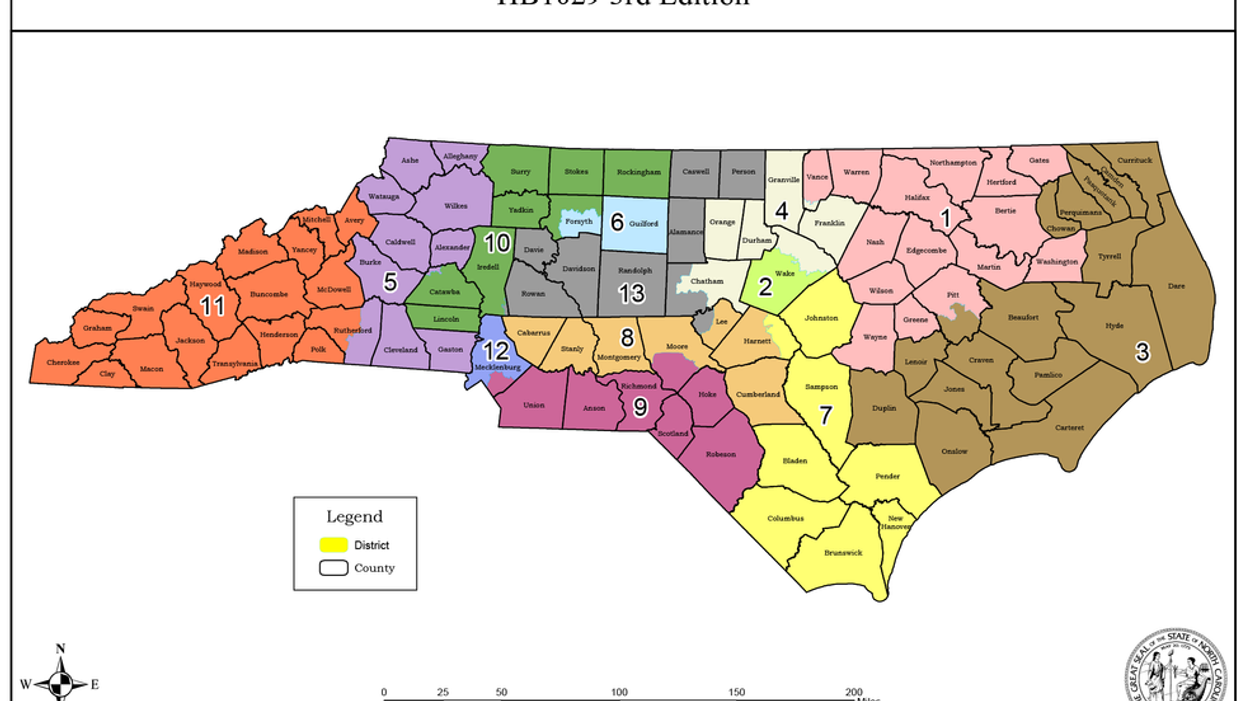The nation's most prominent partisan gerrymandering fight is over. A newly drawn congressional district map for North Carolina will be used in the next election, a panel of three state judges has ruled.
The decision, announced late Monday, brings closure to the most pressing dispute in the country over the limits that politicians may go to in order to pick their own voters, rather than the other way around.
The end result is North Carolina is highly likely to elect five Democrats to Congress in 2020, two more than in most of this decade. Aggressive mapmaking by the Republicans who dominate the General Assembly had resulted in just three of 13 House seats going to Democrats even though their slate of candidates was securing about half the statewide congressional vote — and a slim but clear majority last year.
The three judges in Charlotte who ruled Monday had signaled they were ready to strike down that map as unconstitutional under the fair elections clause of the state Constitution. It was in response that GOP legislators drew new lines designed to shift the balance of power in the delegation from 10-3 to 8-5. Democrats said that still was not fair to them and that the legislators should be ordered back to the drawing board. The judges unanimously disagreed.
"The net result is the grievous and flawed 2016 map has been replaced," Wake County Superior Court Judge Paul Ridgeway said in their opinion.
The judges said that while questions remain about the adequacy of the new map to combat partisan gerrymandering, the political calendar does not allow time for them to be resolved before the congressional primaries March 3. The court had initially halted candidate filing for House seats pending arguments in the case Monday, but allowed the three-week period to go forward along with the ruling upholding the new map.
The Democrats said they will not appeal, citing the timeline for candidate filing and "the nature of today's ruling."
The new lines put incumbent House Republicans Mark Walker and George Holding in the most electoral danger, because they live in what are now solidly Democratic districts. The Democrats initially best positioned for coming to Congress instead are community activist Kathy Manning, who narrowly lost a House bid last year, and 2016 Senate nominee Deborah Ross.
A separate lawsuit, challenging the way the GOP drew the boundaries of the 120 state House and 50 state Senate districts, ended this fall similarly to the congressional suit. The three judges said the old lines went too far to entrench the party in power, the GOP replied with a somewhat modified map, the Democrats said the modifications weren't enough but the court said the redo could stand.
Still, the North Carolina court's actions were a welcome breakthrough for critics of partisan gerrymandering who felt at a big loss after the Supreme Court ruled this summer that federal judges may not get involved in such cases.
"After nearly a decade of voting in some of the most gerrymandered districts in the country, courts have put new maps in place that are an improvement over the status quo, but the people still deserve better," said former Attorney General Eric Holder, who now runs the National Democratic Redistricting Committee, which helped to finance the North Carolina litigation and similar efforts in some other states
In North Carolina, the next opportunity for that will be in 2021, after another election for the General Assembly and a reapportionment of House seats nationwide follows the census, which is likely to bring a 14th seat to the state.




















Trump & Hegseth gave Mark Kelly a huge 2028 gift